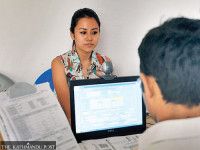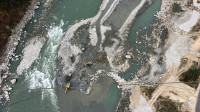National
Global meeting of biodiversity experts begins in Kathmandu
Scientists describe the speed and scale of losses in nature and habitat in the Hindu Kush Himalaya region as catastrophic.Post Report
Scientists have declared the Hindu Kush Himalaya, one of the most biodiverse regions on Earth, a ‘biosphere on the brink’ as a major global meeting of biodiversity experts opens in Kathmandu.
The International Centre for Integrated Mountain Development issued the call as over 130 global experts arrived in Nepal for the third lead authors meeting of the Intergovernmental Science-Policy Platform on Biodiversity and Ecosystem Services nexus assessment. The intergovernmental body examines the linkages between food and water security, health, biodiversity, and climate change.
Researchers at the ICIMOD that is hosting the meeting, describe the speed and scale of losses in nature and habitat in the Hindu Kush Himalaya region, which stretches 3,500 km and spans eight countries, as catastrophic.
“It is almost too late. Four of the world’s 36 global biodiversity hotspots are in this region. A total 12 of the global 200 ecoregions, 575 protected areas, 335 important bird areas, those figures speak for themselves,” Deputy Director General Izabella Koziell told delegates to the meeting.
“Yet we are in an accelerating crisis, despite the efforts of everyone here and many in the international community. 70 percent of the original biodiversity has been lost over the last century. 85 percent of mountain communities remain dependent on this biodiversity, for food, water, flood control and cultural identity.”
Likewise, ICIMOD ecosystems specialist Sunita Chaudhary said the declines in nature across this region are so advanced and accelerating so fast they now pose a threat to the lives of not just animal and plant life, but also human societies.
“This region must be urgently prioritised for investment – to fund the fight to reverse nature loss and species extinction. Worldwide we’re seeing a huge uptick in investments in ecosystem restoration and a growing recognition of nature's role in human survival,” she said.
Chaudhary, with ICIMOD colleagues Abid Hussein and Nakul Chettri, are among the experts contributing to the nexus assessment report, whose final lead authors meeting will be held from February 5-9 at the regional intergovernmental centre’s headquarters in Kathmandu.
The meeting is followed by a meeting to advance a summary for policymakers from February 10-11.
This is the first time the assessment meeting is being held in South Asia and builds on the close working relationship between the Secretariat and ICIMOD.




 9.84°C Kathmandu
9.84°C Kathmandu













